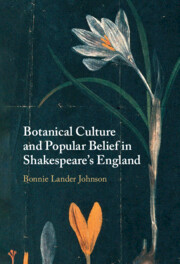
- Publisher:
- Cambridge University Press
- Online publication date:
- January 2025
- Print publication year:
- 2025
- Online ISBN:
- 9781009396530

The Shakespearean stage offered London playgoers a glimpse of the illiterate and rural plant cultures rapidly disappearing from their increasingly urban and sophisticated lives. The same cultures also circulated in popular texts offstage: bawdy tree ballads, botanical tales, almanacs and accounts of kitchen physic. Here Bonnie Lander Johnson argues that, while Shakespeare's plants offered audiences a nostalgic vision of childhood, domestic education and rural pastimes, this was in fact done with an ironic gesture that claimed for illiterate culture an intellectual relevance ignored by the learned and largely Protestant realm of print. Addressing a long-standing imbalance in early modern scholarship, she reveals how Shakespeare's plays – and the popular, low botanical beliefs they represent – engaged with questions usually deemed high, literate and elite: theological and liturgical controversies, the politics of state, England's role in Elizabethan naval conflict and the increasingly learned realm of medical authority.
‘Expertly grafting Shakespeare and critical plant studies, this book establishes that Shakespeare's botanical imagery savoured of the vanishing rural world outside London as well as the burgeoning trade networks of global modernity. Lander Johnson reveals the ubiquitous material presence of plants in early modern households in the form of textiles, dyes, medicines, and food to offer fresh perspectives on four Shakespearean plays, while distilling the rhetorical power of Shakespeare's plants in thorny debates about medical authority, God's immanence in the natural world, and monarchical sovereignty over the realm.'
Todd Borlik - Professor of Shakespeare Studies & Renaissance Literature, University of Huddersfield
‘Drawing on an abundance of rich material and insightful analysis, Lander Johnson breaks new ground in the growing body of research around the culture of botany, plants, and horticulture in early modern England. The book stands out for its focus on the profound religious and popular beliefs associated with the plants evoked in Shakespeare's plays, beliefs that are now lost in time.'
Rebecca Bushnell - School of Arts and Sciences Board of Advisors Emerita Professor of English, University of Pennsylvania
 Loading metrics...
Loading metrics...
* Views captured on Cambridge Core between #date#. This data will be updated every 24 hours.
Usage data cannot currently be displayed.